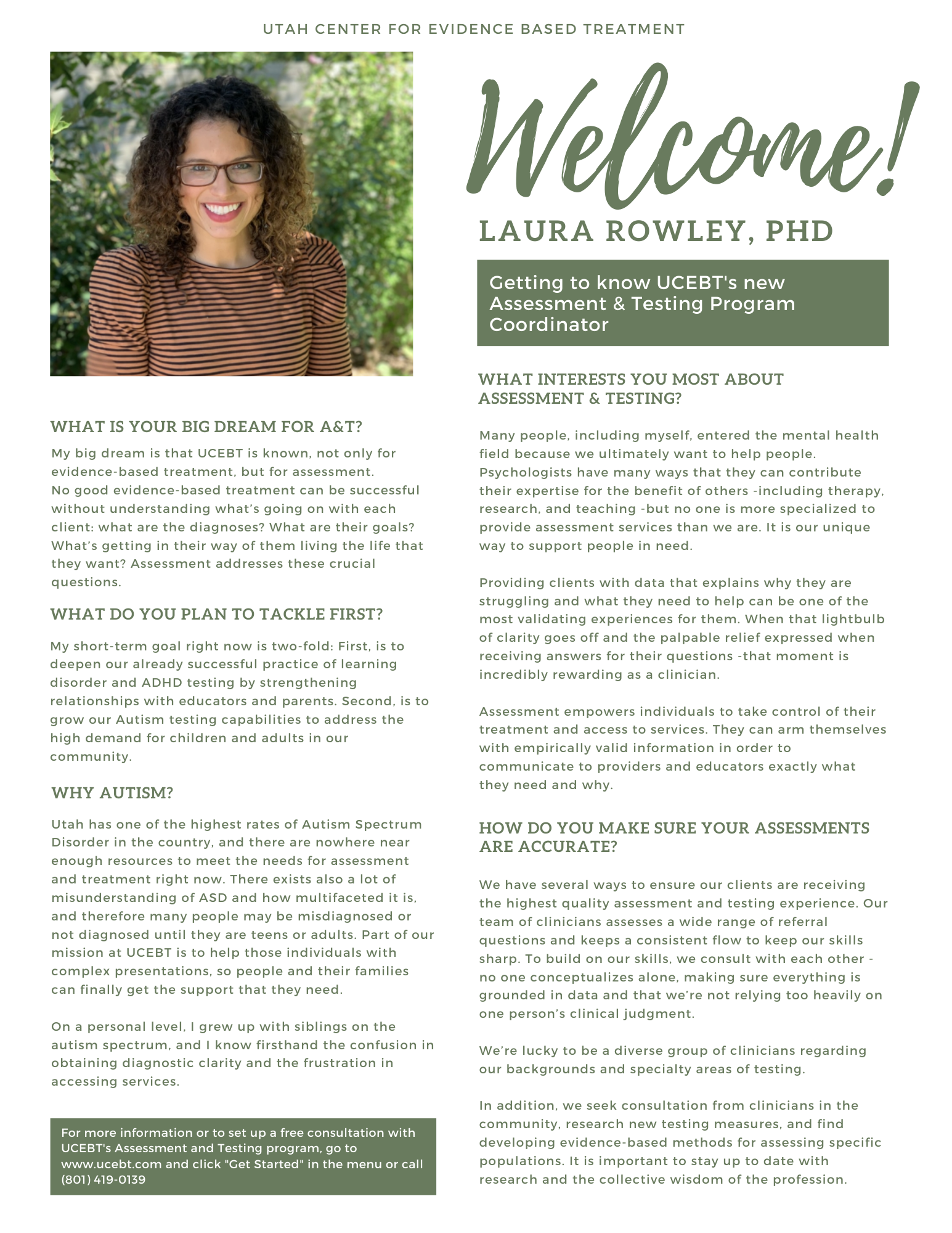Jennifer Van Gorp
We are excited to announce Laura Rowley, PhD as UCEBT's new Assessment and Testing Coordinator! Check out this Q&A with Laura to learn more about her and her goals for the A&T Program.

The Latest on Dialectical Behavior Therapy and Marsha’s Memoir
Originally presented on February 14, 2020 11:45 AM - 1:00 PM
Dialectical behavior therapy (DBT) is an evidence based treatment designed to reduce self-injurious behaviors, decrease suicide risk, and enhance skillful behavior. This lecture will present the latest thinking of DBT experts, brought back to Utah by Dr. Crowell following the November 2019 National ISITDBT conference. Dr. Crowell will also present select segments from Dr. Linehan’s recent memoir, with an emphasis on how Marsha’s personal journey can be used to enhance client motivation and improve treatment outcomes.
About the presenter: Sheila E. Crowell, Ph.D. is the director of the dialectical behavior therapy program at the Utah Center for Evidence Based Treatment and an associate professor of psychology at the University of Utah. Dr. Crowell was previously a doctoral student at the University of Washington and she received training and supervision directly from Dr. Marsha Linehan, the creator of DBT. Dr. Crowell now specializes in dialectical behavior therapy, suicide prevention, and psychopathology.
Death Acceptance: Loss & Restoration
Originally presented on Thursday, March 12, 2020
Dr. Turley recently attended a comprehensive grief & loss conference sponsored by the Association for Death Education & Counseling and will present select segments from that conference, with an emphasis on death acceptance. As with all clinical interventions, attendees should be thoughtful about their own limits and personal willingness with workshop activities.
Sarah E. Turley, Ph.D. Counseling Psychologist, having received graduate training from Southern Illinois University Carbondale. Dr. Turley is a health psychologist having provided 20 years of psychotherapy, including grief, bereavement, and non-body losses.
“Freedom from Survival Mode” at Generations Conference
Three of our clinicians will be presenting in the Post-Conference Master Workshops at this year’s Generations Conference in the afternoon on May 5th, 12:30 p.m. – 5:00 p.m. (4 Hours CE Credit).
Registration is only $135 for this 4-Hour CE event. Participants can attend virtually or in-person.
Shelle Welty, PsyD, Sheila E. Crowell, PhD, and Laura Rowley, PhD, LP will be presenting on “Freedom from Survival Mode: Using Evidence-Based Assessment and Intervention to Identify Posttraumatic Stress and Free Clients from Unrelenting Crisis”.
This presentation will provide guidance for the assessment and treatment of traumatized adults. Evidence-based assessments and treatment modalities will be reviewed with case study material to illustrate applications. Special attention will be given to cultural considerations in trauma treatment. In addition, there will be training in suicide prevention as applicable to this population.
As a result of attending this session, participants will be able to:
- Present the practices of EMDR and Non-EMDR for trauma; and,
- Demonstrate both types of practices for trauma.
Friday, June 11, 2021
12:00 p.m. - 1:30 p.m. MST
1.5 CE hour (UPA & NASW-UT)
Register* here: https://form.jotform.com/211016371639148
*If you cannot attend the live event, you can still receive the video recording, presentation slides, and CE credit so long as you register beforehand.
About the presentation:
With Utah having one of the highest rates of Autism Spectrum Disorder (ASD) in the United States, the community relies on clinicians to provide early identification and intervention for this pervasive neurodevelopmental disorder. Although the last several decades have witnessed an increase in awareness and support for individuals on the spectrum and their families, many people with ASD are not receiving diagnoses and subsequent services until they are older children, adolescents, or even adults.
As research continues to grow, the field is discovering complexities that alter our recognition and understanding of ASD. This presentation will discuss demographic characteristics impacting identification, such as the “female autism phenotype,” autism in racial and ethnic minorities, and the intersection of ASD and LGBTQA+ identities. Furthermore, this talk will present evidence-based guidelines for differential diagnosis and present specific disorders that mimic or mask underlying ASD, including ADHD, OCD, and personality disorders.
Following the hour-long presentation, there will be a 30-minute Question and Answer period.
About the presenter:
Laura Rowley, Ph.D., licensed clinical psychologist. Laura obtained her doctorate from Wayne State University. She completed her APA-accredited internship and postdoctoral fellowship at Primary Children’s Hospital. Laura is currently the Program Coordinator for the Assessment and Testing Team and Utah Center for Evidence Based Treatment, where she provides testing services for children and adults.
Originally presented: Friday, March 12, 2021
1.0 CE hour (UPA & NASW-UT)
To receive presentation recording, slides, and evaluation form for CE credit, register here: https://form.jotform.com/210403657446150
About the presentation:
Acceptance and Commitment Therapy (ACT) is an evidence based therapy designed to increase psychological flexibility through the use of acceptance skills, mindfulness strategies, and commitment and behavioral change planning. This presentation is designed to give therapists and counselors practical skills and strategies to help young people increase overall psychological flexibility and live a life that is meaningful and fulfilling to them. Dr. Hopkins will emphasize developmental considerations to the core components of ACT.
At the conclusion of this presentation, attendees should be able to describe Acceptance and Commitment Therapy and its core components using age appropriate language to kids and their families, adapt ACT metaphors and tools to a younger population, and increase openness to experiential exercises.
About the presenter:
Rachel Hopkins, Psy.D. is a clinical psychologist with broad interests in providing therapy and assessment for anxiety and mood disorders, trauma and bereavement, behavioral dysregulation, and family systems issues across the lifespan. Dr. Hopkins is presently the Program Director for UCEBT's Anxiety and Mood Team and enjoys providing supervision and consultation to trainees and other therapists, particularly in further developing ACT expertise.
Understanding the Risks of Trauma Exposure and Increasing Resilience in Graduate Students
Originally presented: Tuesday, November 17, 2020
NOTE: This is a non-CE event.
To receive the link to the live presentation, register here:
https://form.jotform.com/202996653710158
About the presentation:
Therapists in training experience frequent exposure to traumatic material during both coursework and clinical work. This exposure, especially when combined with the many other stressors of graduate school, can result in emotional, health, and relational problems. Both students and their supervisors in training would benefit from incorporating safeguards for students based on the most recent research findings.
This presentation will provide a review of the most recent research on psychology/social work graduate student responses to trauma exposure, bring greater awareness to graduate students' vulnerabilities to vicarious traumatization and provide direction for building resilience as a novice psychotherapist.
While no traumatic material will be presented, attendees may experience some discomfort at recognizing, in their own lives, current effects of trauma exposure.
About the presenter:
Shelle Welty, PsyD specializes in trauma therapy and works as the Director of the Trauma, Stress, and Resilience program at UCEBT. Prior to her work at UCEBT, she spent a decade working in college mental health, where she was invested in improving the lives of students through multiple roles--as a therapist, a consultant to university faculty and staff, and a professor.
Risk Assessment and Crisis Intervention for Suicidal Adolescents: Practice Guidelines for Telehealth Services during the COVID-19 Pandemic
Originally presented: Friday, October 30, 2020
1.0 CE hour (UPA & NASW-UT)
To receive presentation recording, slides, and evaluation form for CE credit, register here:
https://form.jotform.com/202726500319145
About the presentation:
Suicide rates in youth have been steadily increasing in the United States, with Utah having one of the highest incidences of youth suicides. Furthermore, the COVID-19 pandemic has placed a collective stress on the community and healthcare system.
In a time when hospitals are overburdened, and the risk of exposure is high in healthcare settings, inpatient hospitalization and Emergency Department visits for suicidal patients should be minimized. However, the rapid shift to practicing psychotherapy via telehealth encompasses unique challenges for providers treating youth at risk for suicide.
Dr. Rowley will present research-based practice guidelines on assessing and treating suicidality in youth via telehealth, with a focus on safety planning and Dialectical Behavior Therapy (DBT) skills. Ethical concerns will be discussed, as well as special considerations for treating diverse populations that are at risk for suicide, including LGBTQA+ and black adolescents.
About the presenter:
Laura Rowley, Ph.D., licensed clinical psychologist. Laura obtained her doctorate from Wayne State University. She completed her APA-accredited internship and postdoctoral fellowship at Primary Children’s Hospital as a member of the Dialectical Behavior Therapy team for adolescents and families. She is currently on the DBT team at the Utah Center for Evidence Based Treatment providing services for adolescents and adults.
Navigating Race and Racism: Future Frontiers of Evidence-Based Cultural Competence in Clinical Care
Originally presented: Friday, June 26, 2020
1.0 CE hour (UPA & NASW-UT)
To receive presentation recording, slides, and evaluation form for CE credit, register here: https://form.jotform.com/201625563955157
Here are the two articles referenced in this presentation: (Carter, 2007; Jones, et al., 2020)
About the presentation:
With the recent deaths of George Floyd, Breonna Taylor, and Ahmaud Arbery, as well as the disproportionate impact of COVID-19 in Black and African-American communities, the need to address race and racism in the context of clinical care, including case conceptualization, intervention, consultation, and supervision. This presentation will present a review of race and racial identity from a developmental lifespan perspective, and highlight promising directions in research and clinical care related to providing care for Black American communities in response to racially charged media events.
About the presenter:
Kimberly Applewhite, PsyD, School-Clinical Child Psychology. Dr. Applewhite is a primary member of the dialectical behavioral team at UCEBT, and has clinical and research interests in cultural adaptations for evidence-based treatments in Black/African-American communities.
Psychopharmacology for Non-Prescribers: The Role of Therapists & Psychologists in Medication Management
Originally presented: Tuesday, June 16, 2020
1.0 CE hour (UPA & NASW-UT)
To receive presentation recording, slides, and evaluation form for CE credit, register here: https://form.jotform.com/201528274844155
About the presentation:
The purpose of the presentation is to (1) examine the main structures and function of the brain and neurotransmitters and how the affect our mental health; (2) to review the main types of psychiatric disorders, their presentations/symptoms, neurotransmitters and how they can be treated/managed with psychiatric medications; (3) explain the effect of psychotropic medications on the brain and how they can be therapeutic to the patient/client; (4) and to explain the potential side effects and signs/symptoms that may be observed by other mental health professionals working with the patient.
About the presenter:
Darin Principe, APRN. Darin is a psychiatric/addiction nurse practitioner who trained with the SLC VA prior to joining UCEBT. He is also part of the medical staff at Recovery Ways Treatment Center in Murray, UT for dual diagnosis treatment.













